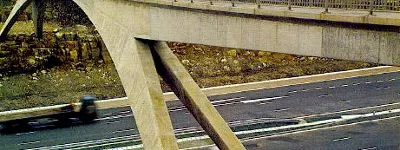Unique among the UK's newest motorways, the M6 Toll is a northern bypass for Birmingham and the West Midlands conurbation, and as its name suggests, it's a toll road.
It opened to traffic in 2003, making it one of the UK's last entirely new motorway routes. It was designed to relieve the choked M6 through Birmingham, Walsall and Wolverhampton, which is not only operating beyond its intended capacity, but also carried on a number of elevated viaducts which are impossible to widen.
This route was first proposed in 1980, and featured in the Roads for Prosperity report, but was shelved in early 1990s spending cuts. So how did it get built if it was shelved so long ago, and when many more recent road schemes were cancelled in 1996?
Easy. This is the first motorway to charge a direct toll to road users - not for a bridge, or a tunnel, just to use the road itself. Since the M4 and M48 across the River Severn had their bridge tolls lifted, it has become the only tolled motorway in the UK.
Midland Expressway Ltd., the consortium that won the contract to build and run it in 1991, have been through a number of buyouts and restructuring exercises in an effort to make this commercial project viable, not least because the motorway does not carry the volume of traffic that was once anticipated. A quick glance at traffic figures on the M6 Toll and on the original M6 would seem to suggest that it's barely doing its job at all, and that the relief it provides is minimal.
The reality is never quite so simple, though. End-to-end traffic surveys indicate that it's actually carrying a reasonable proportion of the traffic that is going all the way from M6 junction 3A, where the toll road starts, to junction 11A where it ends. The issue is simply that most traffic on the M6 between those points is either starting or ending its journey somewhere in the West Midlands, and for those journeys the M6 Toll is no use.
Even so, the toll charges are carefully calibrated to make the most of the limited number of potential users. The structure of charges suggests that private cars are welcome but heavy goods traffic is strongly discouraged, and that's likely to be so that the road takes as little physical wear as possible, reducing running costs and maximising profit.
If the road were free, it might attract a bigger share of journeys with no business in Birmingham, but for now that remains pure speculation. The road will remain in private hands until the 50-year contract comes to an end in 2053. Whether it will then become free to use, or whether another toll franchise will be set up to replace it, only time will tell.
Tolls
Enquiries about toll charges
This is NOT the M6 Toll official website. Please direct all enquiries about the tolls to Midland Expressway Ltd.
| Vehicle class | Mon-Fri 07:00-19:00 |
Mon-Fri 05:00-07:00 19:00-23:00 |
Sat-Sun 05:00-23:00 |
23:00-06:00 |
|---|---|---|---|---|
| Motorbike | £3.40 | £3.30 | £3.30 | £2.30 |
| Car | £7.10 | £6.90 | £6.50 | £4.60 |
| Car + trailer | £10.90 | £10.80 | £9.80 | £7.40 |
| Van, HGV, coach | £12.50 | £12.30 | £11.10 | £9.70 |
| HGV with 6+ axles | £12.90 | £12.80 | £11.50 | £10.00 |
The prices above are intended as a guide only, and were correct at 20 May 2022. Please check the M6 Toll official website for up-to-date prices.
Junctions T3, T4, T5 and T6 are considered "local tolls" as vehicles using these junctions have only used part of the motorway, and tolls are reduced. Motorists using these junctions can expect to pay about £1 less.
The M6 Toll operates a discount scheme for registered users with electronic tags on their vehicles, offering reductions of up to 20% on the rates listed above depending on the package the user is signed up to.
Owners of motor homes, caravans and other similar long vehicles are warned that the tolls are calculated by the height of the vehicle at the first axle and the number of axles.
Coleshill
Cannock
Tamworth, Lichfield, Brownhills, Cannock
27 miles

